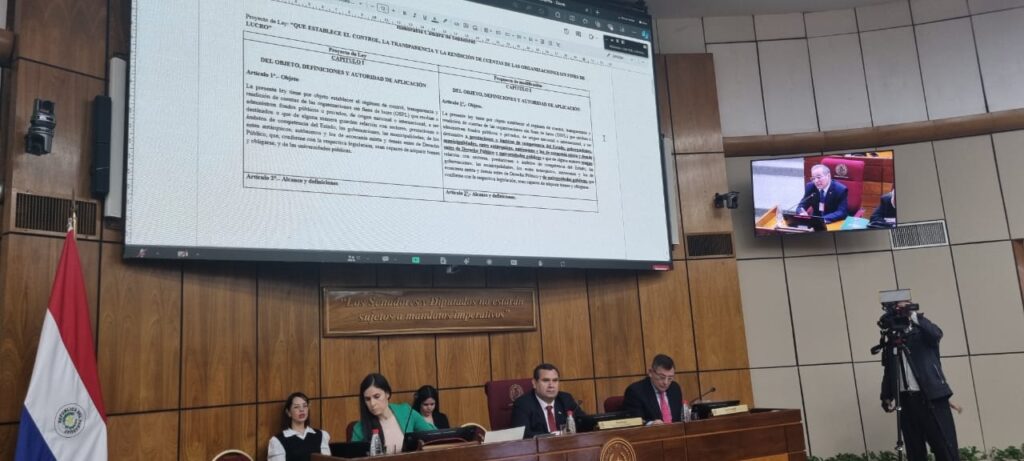
Last July 2024, the Paraguayan Senate approved a controversial bill that, according to human rights defenders and international organizations, seriously endangers the work of non-governmental organizations (NGOs) and civil society in the country. This measure has generated a wave of concern both nationally and internationally, as it could undermine the progress made in the protection and promotion of human rights in Paraguay.
What does this law entail?
The law passed by the Senate, formally known as Draft Law on “National Defense and Internal Security”, introduces a series of restrictions that significantly hamper the work of human rights organizations and civil society. Among the most worrying measures are limitations on foreign funding for NGOs, increased state surveillance of their activities, and the imposition of new administrative obligations that may hinder their operation.
Amnesty International has been one of the most critical voices of this law, pointing out that its implementation could result in the criminalization of those who denounce abuses or fight for the rights of the most vulnerable. In a context like Paraguay, where civil society organizations have played a key role in the fight against corruption, the protection of human rights and the promotion of social justice, this law represents a devastating blow to their operations.
The impact on human rights defenders
One of the most alarming aspects of the bill is its ability to silence human rights defenders. In Paraguay, corruption, repression and human rights violations remain serious problems, and civil society organizations are essential to making these abuses visible and demanding justice. Limiting the funding and scope of action of these entities can have devastating effects, especially in a country where state institutions are weak and where citizens' rights are not always guaranteed.
The law also increases state control over NGOs, requiring detailed reporting of their activities and limiting their ability to receive international funding. In many cases, these funds are crucial to their functioning, as local organizations rely on international partnerships to finance their projects.
Criticism from the international community
Several international organizations, including Amnesty International, have publicly denounced the bill as a direct threat to fundamental rights in Paraguay. In a statement issued in July 2024, Amnesty noted that “the bill represents a serious setback for human rights in Paraguay.” It added that “the government should ensure that civil society organizations can operate freely and without restrictions that hinder their work in defense of human rights.”
This type of legislation is not new in the region. Other Latin American countries have implemented similar measures in recent years, restricting the activity of NGOs and limiting their ability to act. However, the approval of this law in Paraguay is particularly worrying due to the vulnerability of democratic institutions in the country and the crucial role that NGOs play in denouncing abuses.
What's at stake?
The Paraguayan context is unique, but not isolated. For decades, the country has struggled with high levels of corruption and inequality, with a state often unable to guarantee the most basic rights to its citizens. In this scenario, civil society organizations have been instrumental in advancing demands for justice and transparency.
The neighborhood schools, for example, have been spaces where communities organize and fight for their rights. These initiatives, which seek to promote education and citizen participation, could be seriously affected by this law. Restrictions on funding and state surveillance of their activities could slow down the work of these spaces, which are essential for the most vulnerable areas of the country.
On the other hand, the law could aggravate the situation of human rights defenders, who already face strong repression and criminalization in Paraguay. Human Rights Coordinator of Paraguay (Codehupy) In recent years, the Organization has recorded numerous cases of threats and harassment against human rights defenders, especially those working on sensitive issues such as the rights of peasant and indigenous communities and the fight against corruption.
The response of civil society
Despite the blow that this new law represents, civil society organizations in Paraguay have begun to organize to resist its implementation. Several entities, supported by international networks, have called on the international community to pressure the Paraguayan government to modify or repeal the law.
Mobilisations in Paraguay have also begun to take shape, with demonstrations and protests in several cities across the country. Organisations such as FEDEM (Federation of Neighbourhood Entities of Paraguay) and the Citizens' Comptroller's Office of Luque, which fight against corruption and for the rights of communities, have raised their voices against the law, demanding that the government respect the fundamental rights of civil society.
The future of the law and its impact in Paraguay is yet to be defined. However, its implementation could have negative effects not only on human rights organizations, but also on the ability of civil society to demand transparency and justice. While the law has been approved by the Senate, it remains to be seen how the international community will react and whether measures will be taken to mitigate its effects.
It is crucial that the international community and human rights organizations continue to closely monitor the situation in Paraguay. The defense of human rights must not be criminalized, and the work of civil organizations is essential to ensure that the State acts in the benefit of its people.
The passage of this law in Paraguay represents a significant setback in the defense of human rights in the country. Limiting the ability of NGOs to operate freely and without restrictions is a direct attack on democracy and social justice. In a country where corruption and human rights violations are a chronic problem, this law could have devastating consequences for those who already live in vulnerable situations.
International resistance and support will be key in the coming months to ensure that civil society in Paraguay can continue to fight for the rights of all.
